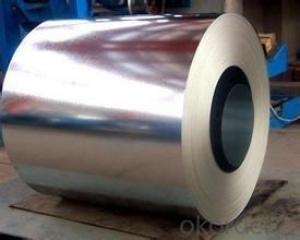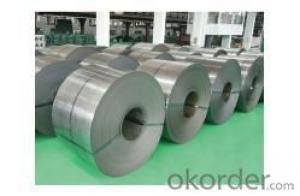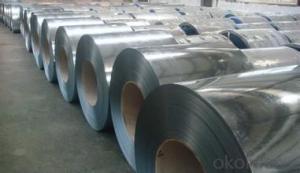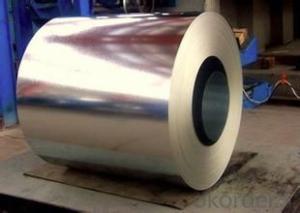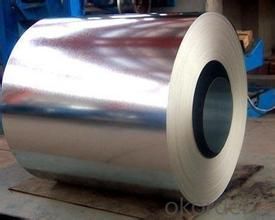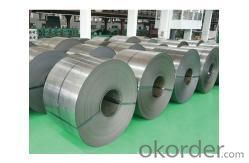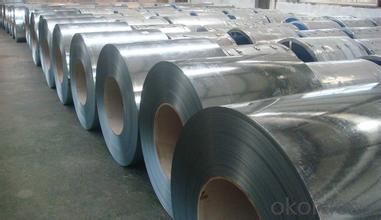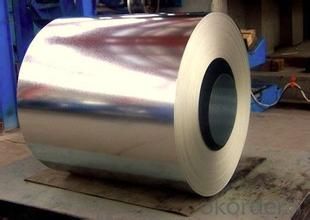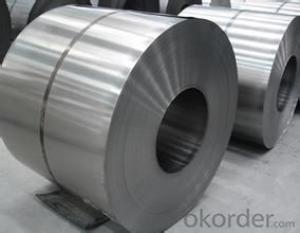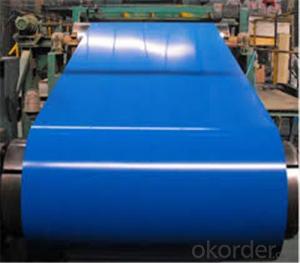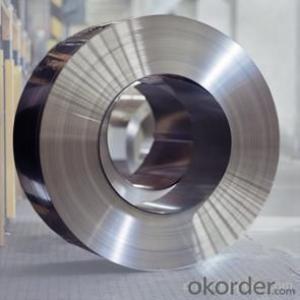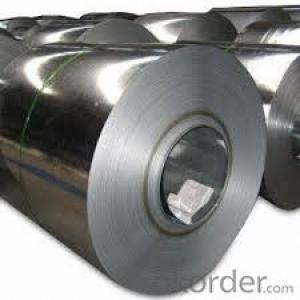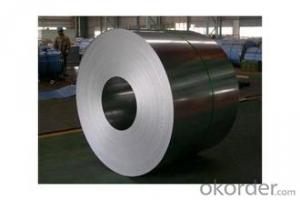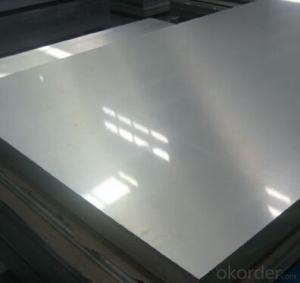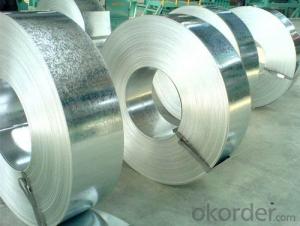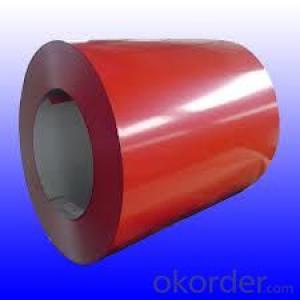hot-dip galvanized/ Aluzinc steel in good Quality
- Loading Port:
- Tianjin
- Payment Terms:
- TT OR LC
- Min Order Qty:
- 100 m.t.
- Supply Capability:
- 5000000 m.t./month
OKorder Service Pledge
OKorder Financial Service
You Might Also Like
Description:
Hot-dip galvanized steel coils are available with a pure zinc coating through the hot-dip galvanizing process. It offers the economy, strength and formability of steel combined with the corrosion resistance of zinc. The hot-dip process is the process by which steel gets coated in layers of zinc to protect against rust. It is especially useful for countless outdoor and industrial applications.
Production of cold formed corrugated sheets and profiles for roofing, cladding, decking, tiles, sandwich walls, rainwater protective systems, air conditioning duct as well as electrical appliances and engineering.
Specification:
1.Mateials:SGCC,DX51D / DX52D /S250,280GD
2.Size:width:600-1250mm(900mm,1215mm,1250mm,1000mm the most common)
thickness:0.15-2.0mm
length:1000-6000mm,as your require
3.Zinc coating :60-180g( as required)
4.Coil id:508mm
5.Coil weight: 3-5MT(as required)
6. Surface:regular/mini/zero spangle, chromated, skin pass, dry etc.
Applications :
Galvalume Coil widely used for roofing products, It is also the ideal base material for Prepainted Steel Coil.
1. roofing
2. gutters
3. unexposed automotive parts
4. appliances
5. furniture
6. outdoor cabinetry
Images:
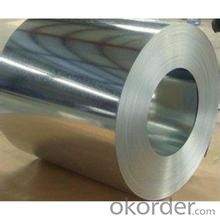
- Q: Fallout 3 take it back quest?if i am in the rotunda and dont have broken steel installed yet so i cant leave if i instal it will i be able to continue the game even if im seconds away from the end without it Additional Detailsi know it continues on but im not sure if it will let me cause i got this far without it 1 objective away from finishing the quest idk if it will change that little bit so i can continue (ps3)already in the purifier place kill col. autum liek i said just gotta do the code thing to it idk if im to far for broken steel to effect this save file
- Yes. The Broken Steel add-on goes automatically where ever you are. The thing is, I would like stand around the control room for a little while until the Broken Steel add-on is completely downloaded (Basically pop A LOT of rad-x and radaway). You should see a pop-up message saying that Broken Steel is installed and the level cap is now at 30.
- Q: Myself, iam Working In a Steel Fabrication Company. I completed my Engineering in 2006 and immediately recruited in this company in Oman. My company is Steel Fabrication company .So as i am new to this field, i just need some basic knowledge regarding this Steel Fabrication.Waiting for ur early reply.
- Your question covers a VERY broad area. This link should help you out, you will still have numerous other places you can look but this will cover your basics.
- Q: what is the difference between stainless steel 304 (AISI 304) and stainless steel 310 (AISI 310) COR-TEN A
- Weathering steel will rust, but the rust will be adherant and not flake off and be replaced by new rust. Therefore once it rusts it will pretty much stop rusting any more. One (severe) down side is that anything around it will be streaked with rust stains and it will look awful. Some bozo with the Texas Department of Transportation designed a number of freeway interchange overpasses here in Houston using Cor-Ten steel and all of the concrete supports are streaked with red rust stains and it looks like hell. Cameron built an office building here in Houston with a Cor-Ten facade and it is streaked with rust too. They should have gone ahead and spent the money and painted them, but they didn't.
- Q: What is the standard thickness of steel coils?
- The standard thickness of steel coils can vary depending on the specific application and industry requirements. However, in general, steel coils are typically available in a range of thicknesses between 0.5mm to 10mm. The desired thickness of a steel coil is determined by factors such as the intended use, structural requirements, and manufacturing processes. Thicker steel coils are often used for heavy-duty applications that require greater strength and durability, while thinner coils are suitable for lighter applications where flexibility and weight reduction are important. It is important to consult industry standards and specific project requirements to determine the appropriate thickness for steel coils in any given application.
- Q: What are the different methods of coil end welding for steel coils?
- There are several different methods of coil end welding for steel coils. These methods include: 1. Resistance Welding: This method involves applying an electric current to the ends of the coils, causing them to heat up and melt together. Resistance welding is commonly used for joining steel coils due to its high efficiency and speed. 2. Laser Welding: Laser welding utilizes a high-energy laser beam to melt and fuse the ends of the steel coils together. This method provides precise control over the welding process and can produce high-quality welds. 3. Tungsten Inert Gas (TIG) Welding: TIG welding uses a non-consumable tungsten electrode and an inert gas, such as argon, to create a protective atmosphere around the welding area. This method is known for producing clean and strong welds, making it suitable for steel coil end welding. 4. Plasma Arc Welding: Plasma arc welding involves using a plasma torch to create an electric arc between the electrode and the workpiece. The intense heat generated by the plasma arc melts the ends of the steel coils, allowing them to be welded together. 5. Electron Beam Welding: Electron beam welding utilizes a high-velocity beam of electrons to heat and melt the ends of the steel coils. This method is often used for joining thick steel coils and offers deep penetration and high welding speed. 6. Friction Stir Welding: Friction stir welding involves a rotating tool that generates friction and heat between the steel coil ends, causing them to soften and fuse together. This method is commonly used for joining aluminum coils but can also be applied to steel coils. These are just a few of the different methods of coil end welding for steel coils. The choice of method depends on various factors such as the desired weld quality, production speed, material thickness, and application requirements.
- Q: So I want to get my 3+ wood shafted with a dynamic gold shaft because i need a stiffer shaft but dont want to spend much on it.I've never swung a steel shafted wood, but I hear that it is more consistent that graphite....Plus, since the cost of steel is only $15 compared to the $65 graphite, not to mention installation charges.So yeah...... How good is steel for fairway woods?BTW, my swing speed is about 95 but i can amp it up to 110 (with control, that is)
- There are very few people who hit steel shafted fairway woods. Tiger Woods used to have a steel shafted 3 wood but went to graphite because it didn't feel right because of his driver. Go get custom fit for a shaft and see if a steel shaft is good to make sure because you don't want to turn aroung a get a graphite shaft anyway if the steel shaft doesn't work. Go with whatg works the first time so you don't put out more money later.
- Q: The steel is orangish in colour and is mostly made of copper
- Steel is an alloy of iron and carbon and optionally one or more of numerous other materials. Copper is normally not used, except sometimes in small percentages. Steel is never yellow or orange in color. Reactivity of steel depends on the materials it is alloyed with. Chromium and nickel with steel make stainless steel, which is much less prone to reactive than iron. .
- Q: How are steel coils used in the manufacturing of drivetrains?
- Steel coils are commonly used in the manufacturing of drivetrains as they provide the necessary strength and durability required for these critical components. The steel coils are typically formed into various shapes, such as gears, shafts, and axles, which are then machined and assembled to create the drivetrain system. These steel components help transfer power from the engine to the wheels, allowing the vehicle to move efficiently and smoothly.
- Q: What are the different methods of blanking steel coils?
- There are several methods for blanking steel coils, including shearing, laser cutting, and waterjet cutting. Shearing involves using sharp blades to cut the coil into desired shapes. Laser cutting utilizes a high-powered laser beam to accurately cut through the steel. Waterjet cutting involves the use of a high-pressure stream of water mixed with abrasive materials to cut the coil. These methods offer different levels of precision, speed, and cost-effectiveness depending on the specific requirements of the blanking process.
- Q: Can steel coils be used in the production of furniture?
- Yes, steel coils can be used in the production of furniture. Steel coils can be used to create sturdy frames for furniture such as chairs and sofas. The coils can be shaped and welded together to provide support and durability to the furniture.
Send your message to us
hot-dip galvanized/ Aluzinc steel in good Quality
- Loading Port:
- Tianjin
- Payment Terms:
- TT OR LC
- Min Order Qty:
- 100 m.t.
- Supply Capability:
- 5000000 m.t./month
OKorder Service Pledge
OKorder Financial Service
Similar products
Hot products
Hot Searches
Related keywords
